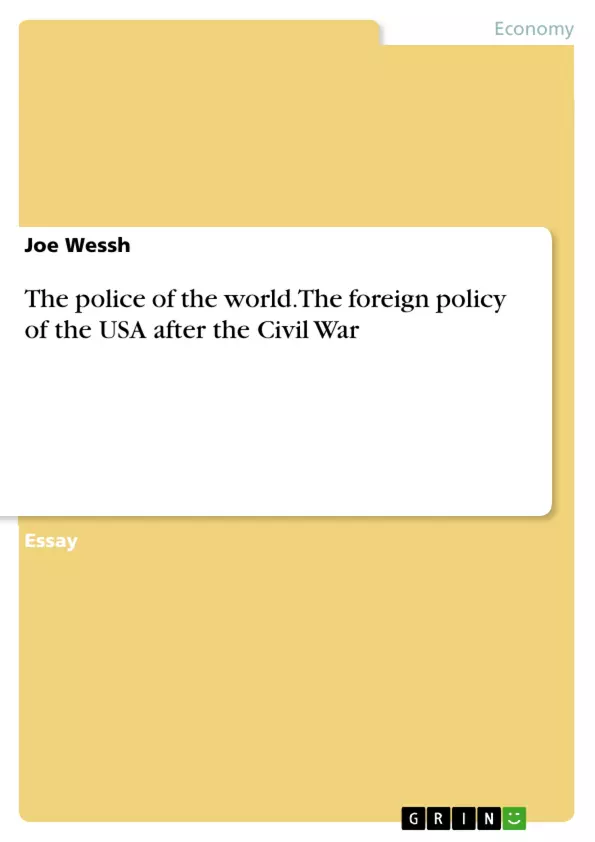The revolution of the United States foreign policy following the civil war has steadily advanced and this has resulted in the formation of regional and international policies. United States military policy openly calls for full spectrum supremacy over all possible opponents, in every class of warfare, for the unknown future. This policy covers the mechanism of the earth’s outer space and atmosphere, where countless disastrous weapons have recently been used.
Under no circumstances in world history has one country applied such power over the rest of the world or taken out such massive economic advantage. By the mid-20th century, the United States had become the leading force in international relations. Some have argued that the United States military operates as the world police. This is evident in the recent participation of the United States military in Iraq, Afghanistan, Somalia, Iran, and other parts of the Middle East. Currently, the United States has been the perfect instance of the police of the world. This particular piece of work is meant to discuss that the United States military should operate as the world police by depicting the recent operations in different parts of the world.
Inhaltsverzeichnis (Table of Contents)
- Introduction
- The Rise of the United States as a Superpower
- Expansion of the Economy
- The Influence of World War I
- The Role of World War II
- The United States as the World Police
- The Cold War and the Division of Powers
- International Policies and Military Organizations
- Conclusion
Zielsetzung und Themenschwerpunkte (Objectives and Key Themes)
This work examines the rise of the United States as a superpower and argues that the US military should operate as the world police. The author traces the development of US foreign policy from the end of the Civil War to the present day, highlighting the key factors that have contributed to America's dominance.
- The United States' emergence as a global superpower
- The role of economic and military power in shaping US foreign policy
- The impact of the Cold War on US foreign policy
- The argument for the United States to act as the world police
- The benefits and challenges of US global leadership
Zusammenfassung der Kapitel (Chapter Summaries)
- Introduction: The introduction sets the stage for the work by outlining the argument that the United States should act as the world police. It highlights the recent involvement of the US military in Iraq, Afghanistan, Somalia, and Iran, as well as the country's role in preventing nuclear proliferation.
- The Rise of the United States as a Superpower: This section examines the factors that contributed to the United States' rise to superpower status. It discusses the expansion of the economy, the influence of World War I, and the role of World War II. The section also highlights the unique geographical advantages and technological advancements that contributed to US prosperity.
- The United States as the World Police: This section delves into the argument for the United States to act as the world police. It discusses the Cold War and the division of powers between the Western and Eastern blocs. The section also examines the role of international policies and military organizations in shaping US foreign policy.
Schlüsselwörter (Keywords)
This text focuses on the role of the United States as a superpower, examining its international policies, military power, and global leadership. Key topics include the rise of US economic and military dominance, the impact of World Wars I and II, the Cold War, and the argument for the United States to act as the world police. The text explores the concept of global power and its influence on international relations, analyzing the benefits and challenges of US leadership in the 21st century.
Frequently Asked Questions
How did the United States emerge as a global superpower?
The rise was driven by rapid economic expansion, technological advancements, and the influential roles played during World War I and World War II.
What does the term "world police" mean in this context?
It refers to the US military's role in intervening in international conflicts and maintaining global stability, as seen in Iraq, Afghanistan, and Somalia.
What impact did the Cold War have on US foreign policy?
The Cold War led to a division of power between Western and Eastern blocs, prompting the US to develop regional and international military policies for full spectrum supremacy.
Why does the author argue for the US to act as a world police?
The author suggests that US military power can prevent nuclear proliferation and address humanitarian or security crises in different parts of the world.
What are the challenges of US global leadership?
The text explores the unsettling ambivalence of international power and the ethical considerations surrounding massive economic and military influence.
- Arbeit zitieren
- Joe Wessh (Autor:in), 2015, The police of the world. The foreign policy of the USA after the Civil War, München, GRIN Verlag, https://www.grin.com/document/383568



